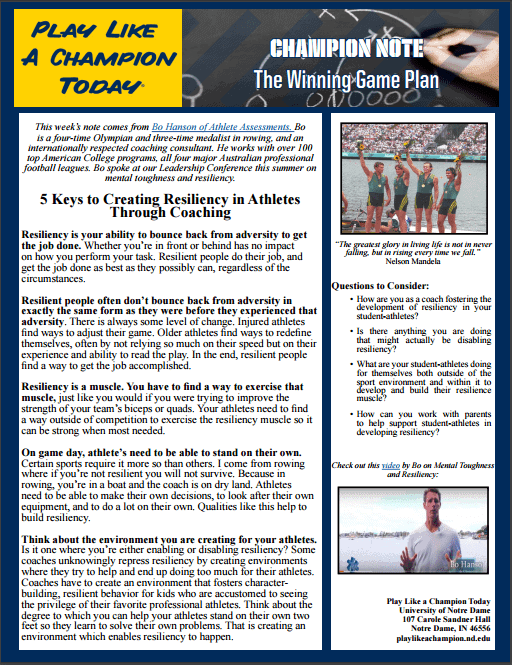In June 2015, Bo and Liz Masen presented as keynote speakers at the ‘Play Like A Champion Today National Sports Leadership Conference’ at the University of Notre Dame. Play Like a Champion provide weekly Champion Notes for coaches, student-athletes and parents.
“The notes are typically written by Play Like a Champion experts, but also highlight the insights and best practices of those who are a part of the Play Like a Champion community, and we are thrilled to welcome guest writers on occasion.”
Bo Hanson was recently invited to contribute as a guest writer on the topic of Creating Resiliency in Athletes through Coaching. You can view an image of the Coach Note below, or you can view the higher resolution version in the Play Like a Champion PDF Coach Note.

You can watch Bo speak on Mental Toughness and Resiliency here:
5 Keys to Creating Resiliency in Athletes through Coaching:
- Resiliency is your ability to bounce back from adversity to get the job done. Whether you’re in front or behind has no impact on how you perform your task. Resilient people do their job, and get the job done as best as they possibly can, regardless of the circumstances.
- Resilient people often don’t bounce back from adversity in exactly the same form as they were before they experienced that adversity. There is always some level of change. Injured athletes find ways to adjust their game. Older athletes find ways to redefine themselves, often by not relying so much on their speed but on their experience and ability to read the play. In the end, resilient people find a way to get the job accomplished.
- Resiliency is a muscle. You have to find a way to exercise that muscle, just like you would if you were trying to improve the strength of your team’s biceps or quads. Your athletes need to find a way outside of competition to exercise the resiliency muscle so it can be strong when most needed.
- On game day, athlete’s need to be able to stand on their own. Certain sports require it more so than others. I come from rowing where if you’re not resilient you will not survive. Because in rowing, you’re in a boat and the coach is on dry land. Athletes need to be able to make their own decisions, to look after their own equipment, and to do a lot on their own. Qualities like this help to build resiliency.
- Think about the environment you are creating for your athletes. Is it one where you’re either enabling or disabling resiliency? Some coaches unknowingly repress resiliency by creating environments where they try to help and end up doing too much for their athletes. Coaches have to create an environment that fosters characterbuilding, resilient behavior for kids who are accustomed to seeing the privilege of their favorite professional athletes. Think about the degree to which you can help your athletes stand on their own two feet so they learn to solve their own problems. That is creating an environment which enables resiliency to happen.
Questions to Consider:
- How are you as a coach fostering the development of resiliency in your student-athletes?
- Is there anything you are doing that might actually be disabling resiliency?
- What are your student-athletes doing for themselves both outside of the sport environment and within it to develop and build their resilience muscle?
- How can you work with parents to help support student-athletes in developing resiliency?
If you would like to read similar articles you may enjoy our unique experience learning Mental Toughness from the US Navy Seals, Why Mental Skills are Important in Sport, Mental Skills in Sport: Preparing your Athletes for Success, and Building Personal and Performance Character.
At Athlete Assessments, we’re here to provide you with excellence in service and to help you be your best. If there is anything we can assist you with, pleaseContact Us.





